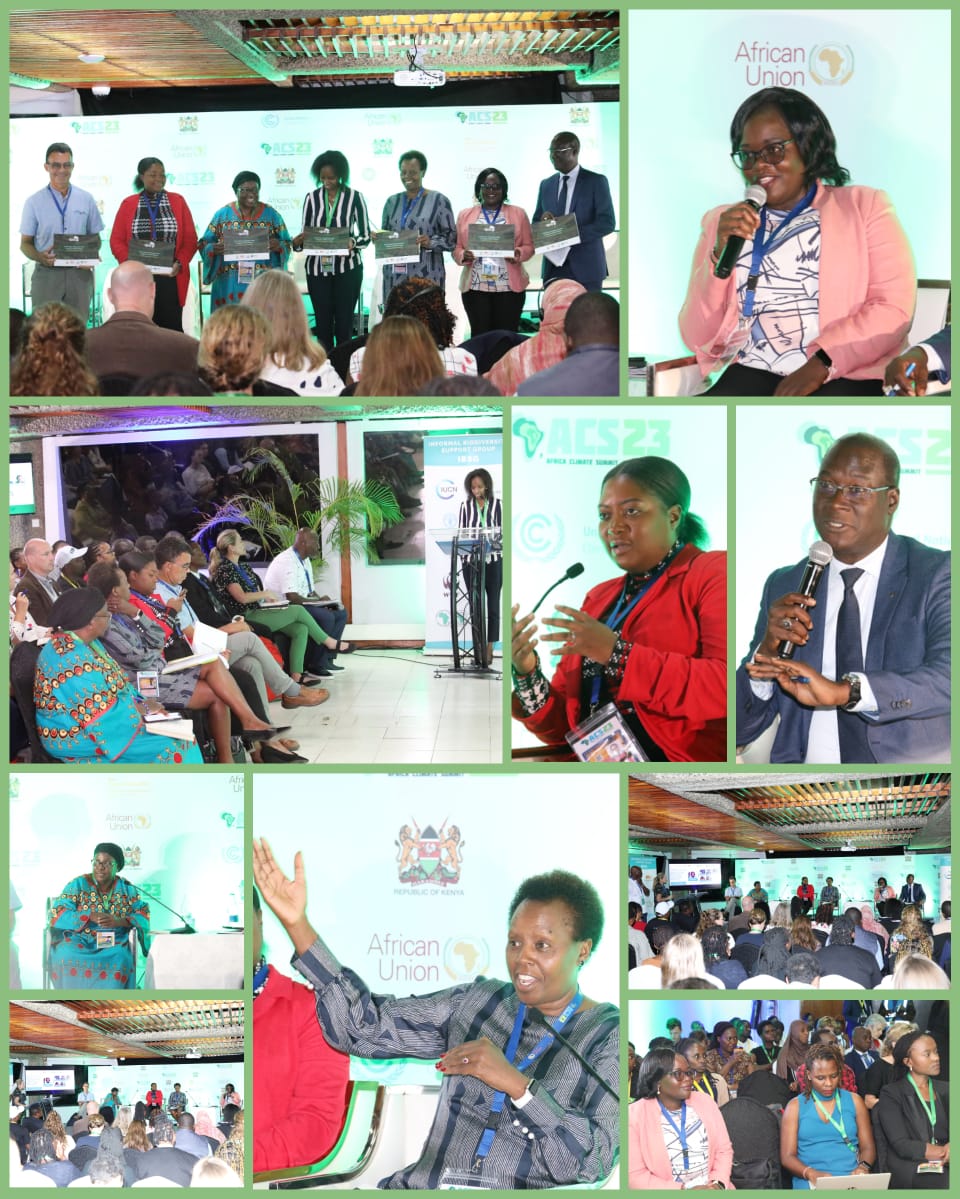On 7th September 2023, we under KEPSA, participated in a High-level ministerial dialogue on “Nature as the Backbone for Climate and Biodiversity Solutions” on the sidelines of the Africa Climate Week. The African Wildlife Foundation (AWF) and partners organized it, including IUCN, UNEP, AfDB, AUC, FAO, AUDA-NEPAD, and WWF.
Faith Ngige, the CBIN-K Coordinator under KEPSA, joined a panel seeking to promote the concurrent implementation of nature and climate change actions to accelerate Agenda 2063 aspirations, the targets in the Paris Agreement, and the Kunming-Montreal Global Biodiversity Framework.
“For a long time, we’ve safeguarded nature with law; while that is good, it has developed a negative relationship with nature,” said Faith, adding, “We must use various instruments to re-create a positive relationship, especially using assisted compliance for businesses.”
“Financial performance on a dead planet is irrelevant. If nature is not at the center of the business, then that money has no value. We no longer should do environmental business as a CSR but as a responsibility to include nature in our business model by design,” She concluded.
She was echoed by Jane Karuku, the CEO of East African Breweries, underlining this as the only way for businesses to thrive and become future-proof. “By 2030, we want to be carbon net zero. And we’re not doing it for the profits but because we have and will continue having nature, the environment, and people at the heart of our business strategy,” she said.
The side event saw the launch of the IUCN Africa Protected Areas Congress (APAC) Report. The report deliberates on major issues affecting conservation efforts, including the need for improved governance in conservation; empowering communities living in and around protected areas; the place and role of indigenous people and local communities (IPLCs) in conservation; respecting and recognizing the wide variety and number of indigenous and community-conserved areas; infrastructural development and its impact on nature; resource conflicts; the impact of climate change on biodiversity and ecosystems, and how to sustainably finance conservation.
“Climate change, biodiversity loss, and development in Africa are inescapably linked and must be addressed collectively and urgently. Our continent not only experiences the brunt of climate impacts but also holds the key to crafting sustainable solutions, with people at the heart of everything we do. We must have a paradigm shift and lead the climate and biodiversity agenda globally. The journey for this necessitates decisive action,” emphasized Beatrice Cyiza – Director General Environment and Climate, Rwanda Ministry of Environment.
She noted that the report, therefore, is a compass that guides decision-makers in protecting and conserving nature. “This report aims to catalyze action, showcasing examples of nature-based solutions enabled by collective actions by the communities, the public and private sectors, civil society, and development partners.”
The speakers underscored healthy and productive ecosystems as the foundations for natural systems for regulating climate. Ecosystems also build communities’ resilience to withstand climate change’s impacts.
“Involving communities is one of the most important nature-based solutions to climate change. The community is always ahead with everything because we’re on the ground, interacting with the ecosystem, and we better understand the interconnectedness between nature and our livelihoods. We have the traditional knowledge and instruments crucial in helping us implement, monitor, and evaluate nature-based solutions. Further, we want to conserve our land because that is our home. Mother Earth is our home,” accentuated Lucy Mulenkei, the Indigenous Information Network Executive Director (IIN).
David Obura, Director of CORDIO East Africa, couldn’t agree more. “Protected areas also mean protecting and empowering the people who depend on it. For businesses, we cannot underscore our responsibility in integrating approaches that minimize our negative impacts and instead empower the people, alongside nature and our profits.”
“We need to develop a government approach and a community approach and increase diversity and inclusion in policy implementation. A lack of finance for climate change and biodiversity makes developing possible and implantable biodiversity action plans difficult,” added Elizabeth Gulugulu, Environmentalist and a Climate Change Consultant.
This side event sought to build momentum and promote nature-based solutions to co-implement the Paris Agreement and the Kunming-Montreal Global Biodiversity Framework (GBF) to address the planetary crises of biodiversity loss and climate change. The GBF sets the targets to be achieved by 2030.
Target 8 seeks to minimize the impact of climate change and ocean acidification on biodiversity and increase its resilience through mitigation, adaptation, and disaster risk reduction actions, including through nature-based solutions and/or ecosystem-based approaches, while minimizing negative and fostering positive impacts of climate action on biodiversity.
“We are increasingly assessing and mainstreaming nature-based solutions across the different sectors from Agriculture, green economy, and manufacturing. We will never achieve the 2030 targets if we continue business as usual. We must, therefore, incorporate innovative solutions, including nature, and work with the private sector to mobilize investments to scale,” concluded Arona Soumare, Principal climate change and green growth officer at the African Development Bank Group.


